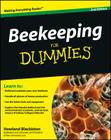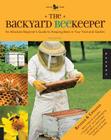Matt joins Eric to answer Beekeeping for Beginners questions on this show. What equipment to buy, how to buy honeybees, where to put beehives in your yard, what kind of beekeeping suit to buy all answered here.
what kind of beekeeping suit and beekeeping veil is good?
what kind of frames should i use in the beehive, are plastic frames better than wood frames?
wax foundation versus plastic foundation should i use plastic or wax foundation on the frames of the beehive? eric talks about the benefits of wax foundation and plastic foundation and frames
Eric suggests 2 beekeeping for beginners books,
Buy On IndieBound Here
Click Here to buy on Amazon
Click Here to Buy On Indiebound
Click Here To Buy On Amazon
Beekeeping for Dummies and the Backyard Beekeeper
do you paint the outside of the beehive? yes, we use latex paint.
should i buy 8 frame supers or 10 frame supers? matt and eric talk about the benefits of 8 frame boxes and 10 frame boxes
what kind of beekeeping tools should i buy? eric suggests bringing duct tape, scissors, entrance reducer, smoker, woodchips, matches, 2 or 3 hive tools, a frame grabbing tool, needle nose pliers and more.
what kind of hive stand should my beehive rest on? cinder block, wood, metal stands are talked about, eric suggests having a work table next to your hives.
we talk about benefits of top bar hives vs. langstroth hives, and the drawbacks of top bar hives and langstroth beehives.
should you buy a bee package or a honeybee nuc? eric talks about the advantages of honeybee packages , the pros and cons of bee packages, and the benefits of being a nuc or nucleus hive to start a beehive.
eric advocates buying local honeybees and queens, either packages or nucs, the closer you can buy your bees the better.
www.whiteoakapiary.com in Brewster, NY and www.warmcolorsapiary.com in Greenfield, MA is where eric buys queens and honeybees.
should you feed honeybees in winter and how do i feed my bees over the winter? eric talks about how to feed bees in winter. you can watch our Beekeeping for Beginners video series here, and several videos are about feeding bees in winter.
Eric uses a hand immersion blender to mix this sugar feed solution, and adds this homemade essential oil recipe for bees to the sugar
The essential oil mixture is great for spraying the bees to combat nosema and bee diarrhea.
winterizing beehives is discussed, here is eric’s beehive insulated inner cover video, Eric feeds sugar cakes to the bees in winter, not fondant or sugar syrup. Should you close or open a screened bottom board? Matt and Eric discuss
Mudsongs.org is a favorite beekeeping blog of eric’s. Phillip documents his beekeeping in Newfoundland Canada.
where to site your hives in your yard, where should you put the hives, what is the best location for beehives? eric has learned that full sun is best, he talks more about it during this radio episode.
should I take a beekeeping class? eric says yes.
and join your local beekeeping group. search on the web for your state’s beekeeping association, and that site should list local beekeeping groups.
Megan of BrooklynHomesteader.com offers online beekeeping classes, and in-person classes as well.











 Fixing an iphone with large fingers takes up more time than one would think in this show, and Mike offers his take on the iphone button and what might be wrong with it. Joel thanks eric and mike for being ‘helpful’.
Fixing an iphone with large fingers takes up more time than one would think in this show, and Mike offers his take on the iphone button and what might be wrong with it. Joel thanks eric and mike for being ‘helpful’.

 BTW, to make baking powder, use 1 part baking soda to 2 parts cream of tartar. You can buy
BTW, to make baking powder, use 1 part baking soda to 2 parts cream of tartar. You can buy




 Deer Hunting can be an emotional topic for some of us. My thinking here was to allow you all to get into the head of a hunter who is very grounded. Jackson hunts deer to put meat on the table for his family, teaches deer hunting classes, and has been
Deer Hunting can be an emotional topic for some of us. My thinking here was to allow you all to get into the head of a hunter who is very grounded. Jackson hunts deer to put meat on the table for his family, teaches deer hunting classes, and has been 


